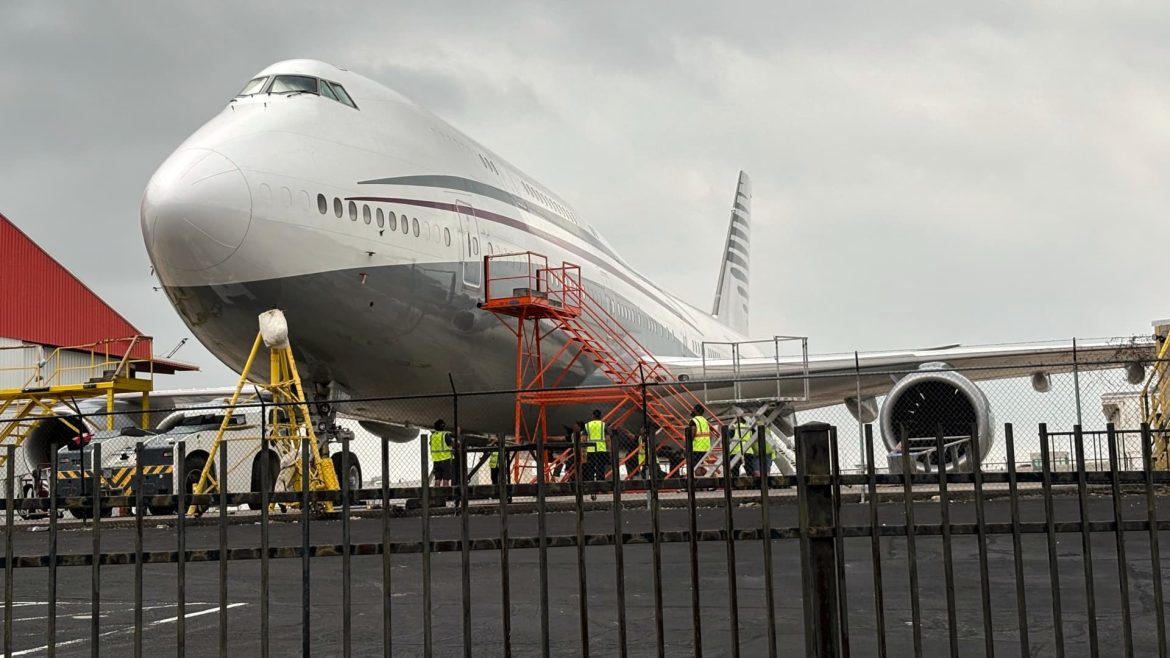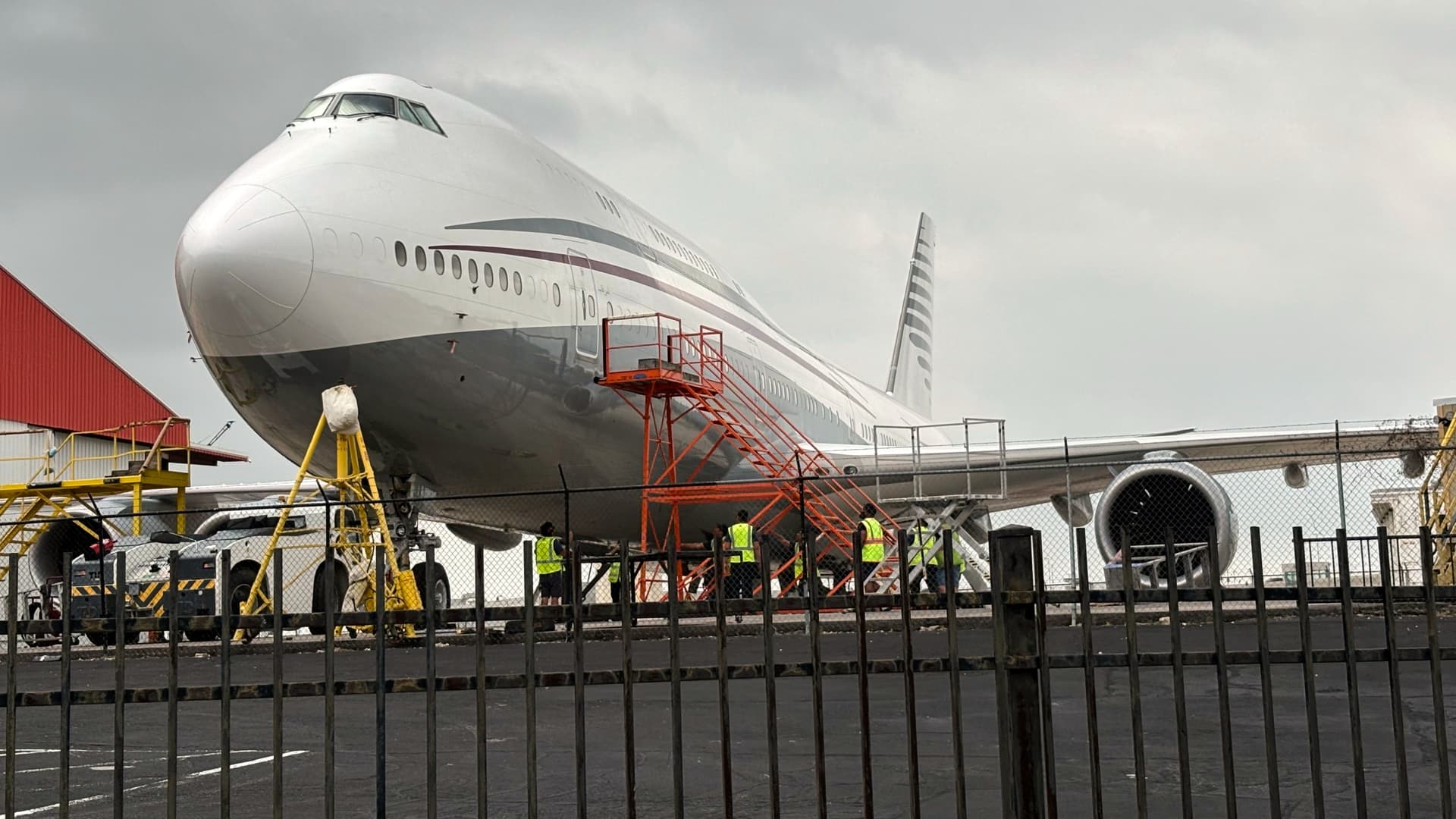Unpacking the Controversy Surrounding Trump’s Acceptance of Qatar’s $400 Million Jet Gift
The plan for President Donald Trump to accept a luxury Boeing 747-8 jet from Qatar’s royal family as a gift quickly morphed into a fiery political debate, igniting bipartisan concern and a rare intersection of criticism from both Republican and Democratic lawmakers. This report navigates the multiple dimensions of this unfolding saga, spotlighting key reservations, ethical quandaries, national security implications, and political ramifications.
—
The Core of the Controversy: A High-Value Gift Amid National Security Concerns
Central to the uproar is the sheer value and nature of the gift — a Boeing 747-8 jet worth approximately $400 million, intended for conversion into Air Force One. The official narrative underscores that the jet would be “free of charge” and serve as a replacement for the current presidential aircraft. However, the gift’s generosity immediately raised eyebrows regarding possible embedded risks.
Republican Senator Susan Collins of Maine, a vocal critic, described the transaction as “rife with political espionage.” Similarly, Senator Ted Cruz of Texas echoed this anxiety, warning that acceptance of the jet “poses significant espionage and surveillance problems.” Such assertions are grounded in the potential for the aircraft to be equipped with covert surveillance devices or other compromising technologies — concerns exacerbated by Qatar’s contentious geopolitical alliances and its complicated history regarding regional conflicts.
Republican Senator Roger Wicker, chairman of the Senate Armed Services Committee, commented that deploying a gifted aircraft would be analogous to “the United States moving into the Qatari embassy,” emphasizing the gravity of potential security breaches. Other GOP senators, including Rick Scott, expressed skepticism rooted in Qatar’s past support of groups like Hamas, further complicating the assessment of trustworthiness regarding the gift.
—
Ethical and Legal Dimensions: Navigating the Limits of Presidential Acceptances
Beyond national security, the proposal exposes significant ethical and legal tensions. Several Democratic senators, including Cory Booker, have indicated plans to push for a formal vote condemning the acceptance of the jet. The optics of a sitting president receiving an extravagant gift from a foreign government raise questions of bribery, undue influence, or favoritism that challenge constitutional and legislative norms.
Experts and lawmakers have highlighted the ambiguous legality of such an expensive gift. Typically, gifts from foreign governments to U.S. officials must adhere to strict regulations under the Foreign Gifts and Decorations Act, which generally limits the acceptance of items of significant value to prevent conflicts of interest. The caliber of this gift—valued at hundreds of millions—places it far outside ordinary bounds and amplifies calls for oversight.
The potential of Trump to retain ownership of the plane post-presidency also adds to the complexity, suggesting a personal benefit deriving from official interactions with a foreign sovereign. This intensifies concerns over the appropriateness and transparency of the arrangement.
—
Bipartisan and Intraparty Reactions: A Rare Rift Among Republicans
While some Republicans, including staunch Trump supporters, have downplayed the controversy—Markwayne Mullin of Oklahoma dismissed the issue as “stupid” and routine given the historical precedent of US officials receiving foreign gifts—growing dissent among GOP lawmakers illustrates unease transcending party loyalty.
Notably, Senator Susan Collins and Senator Ted Cruz publicly refuted the narrative that acceptance is harmless. They join bipartisan efforts alongside Democratic colleagues demanding clarification, security audits, and possibly the outright rejection of the gift.
Former Republican presidential contender Nikki Haley decried the arrangement as “morally wrong” and “politically suicidal,” signaling how even influential Republican figures fear the reputational damage and national security risks might outweigh any perceived diplomatic gain.
This fracturing within the Republican ranks reflects a broader tension between traditional national security priorities and the Trump administration’s approach to foreign diplomacy and personal aggrandizement.
—
The Strategic and Diplomatic Backdrop: Qatar’s Motives and U.S. Reactions
Qatar’s willingness to offer such an extravagant gift is situated within a complex geopolitical context. Historically, the country has been both a U.S. ally and a controversial actor due to its financial and political support for various groups in the Middle East. The gift could be interpreted as an effort to deepen bilateral goodwill or cement influence with the Trump administration.
However, this strategic gesture may backfire if viewed as an intrusion into U.S. sovereign assets, especially given previous allegations connecting Qatar with contentious funding in the region, including past links to Hezbollah and ongoing tensions stated by U.S. lawmakers.
The U.S. government, as exemplified by Senate opposition and security committee concerns, appears poised to demand rigorous inspections and perhaps impose modifications to the aircraft to mitigate espionage risks. Yet, the underlying diplomatic discomfort remains palpable.
—
Financial and Practical Considerations: Beyond the Initial Valuation
Though initially touted as a $400 million gift, some analyses suggest the total cost associated with converting, securing, and maintaining the gifted plane could surpass $1 billion. This includes comprehensive counter-surveillance retrofits, integration of U.S. communications and defense systems, ongoing operational costs, and possible political capital spent navigating the fallout from acceptance.
Moreover, the practicality of employing a foreign-owned or gifted aircraft as Air Force One poses logistical and symbolic challenges. Senator Wicker’s remarks about the U.S. “moving into the Qatari embassy” metaphorically illustrates how such presence could be perceived as compromising American sovereignty and security posture.
—
Conclusion: A Politically Fraught Gift That Tests Boundaries
The decision by President Donald Trump to accept a luxury Boeing 747-8 jet from Qatar epitomizes a rare convergence of national security concerns, ethical debates, and partisan discord within the U.S. government. While framed as a gracious diplomatic offering, the transaction carries with it profound implications:
– Security Risks: The potential for espionage and surveillance embedded within the gifted jet alarms lawmakers across party lines.
– Ethical and Legal Quandaries: The gift’s magnitude and implications challenge established norms governing foreign gifts and presidential conduct.
– Political Divides: The controversy fractures GOP unity, with prominent Republicans publicly opposing the acceptance.
– Diplomatic Underpinnings: Qatar’s motivations raise questions about influence and trust in international relations.
– Financial and Operational Costs: The true price of the jet extends well beyond its sticker value, incorporating necessary security, maintenance, and political capital expenditures.
As this issue unfolds, it shines a spotlight on the complex interplay of diplomacy, national interest, and presidential prerogative, proving that even the most lavish gifts come wrapped in layers of controversy and consequence. The ultimate judgment on this unprecedented transaction will shape perceptions of American governance and foreign policy for years to come.


